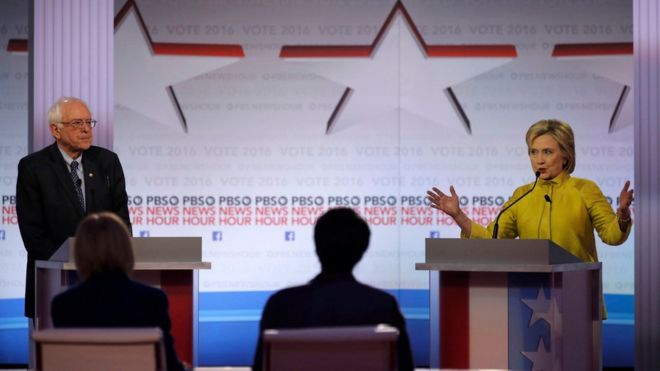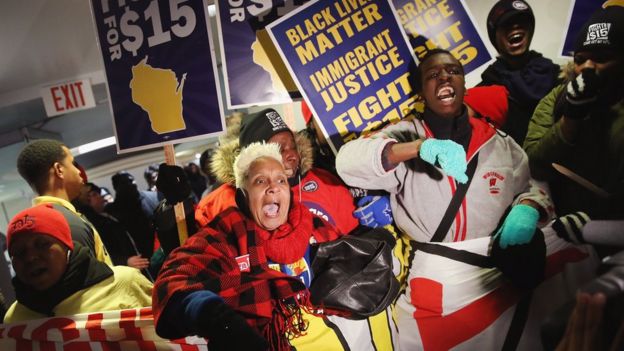
Democratic candidates Hillary Clinton and Bernie Sanders clashed over support for the president in their first debate since the New Hampshire primary.
Mrs Clinton sought to cast herself as the protector of Barack Obama's legacy, sharply attacking Mr Sanders for criticising the president.
"The kind of criticism I hear from Senator Sanders, I expect from Republicans," Mrs Clinton said.
Nevada and South Carolina, states with large minority populations, vote next.
At the PBS NewsHour televised debate, Mrs Clinton repeatedly emphasised her ties to Mr Obama who is extremely popular among minority voters.
Meanwhile, Mr Sanders took pains to tailor to his message of economic fairness to address disparities in black communities.
Mrs Clinton also stressed her pragmatism, questioning Mr Sanders' pledges to provide universal healthcare and free higher education.
"We have a special obligation to make clear what we stand for which is why we can't make promises we can't keep," Mrs Clinton said.

Immigration reform was also a major topic of discussion. Both candidates supported creating a path to citizenship for the nearly 11 million undocumented immigrants in the US and they decried a recent uptick in deportations by the Obama administration.
Criticising the anti-immigrant positions of Republican front-runner Donald Trump, Mr Sanders said immigrants should not be scapegoats for economic uncertainty.
"We have got to stand up to the Trumps of the world, who are trying to divide us," Mr Sanders said.
Debate highlights:
Borrowing language from her opponent, Mrs Clinton said the economy was "rigged" in favour of the rich.
Mr Sanders took aim at mass incarceration, promising if elected the US would no longer have the largest prison population in the world.
Mrs Clinton contended that Mr Sanders' sweeping proposals would increase the size of the government by 40%.
Mr Sanders spoke more authoritatively on foreign policy, a weakness in earlier debates.
Asked to name a foreign leader they admired, Mr Sanders pointed to Winston Churchill while Mrs Clinton selected Nelson Mandela.
Mrs Clinton is trying to rebuild her campaign after Mr Sanders decisively won the New Hampshire primary.
She received a much-needed endorsement from an influential bloc of black Democrats in Congress on Thursday.
The Vermont senator won the New Hampshire primary by 22 percentage points and lost the Iowa caucuses narrowly, but both states have nearly all-white populations.
He now faces the challenge of finding votes among the sizable Latino and black electorates in Nevada and South Carolina.
But the former secretary of state has strong support among Latinos and African-Americans and is expected to do well in the two states.
A recent NBC News/Wall Street Journal/Marist poll in South Carolina gave Mrs Clinton a lead of 74 over Mr Sanders' 17 percent among black voters.
On Thursday, the political action committee of the Congressional Black Caucus (CBC) publicly endorsed Mrs Clinton as their Democratic presidential candidate, giving an added boost to her campaign.
"We must have a president that understands the racial divide, not someone who just acquired the knowledge recently but someone...who has lived it and worked through it down through the years," CBC Chairman G K Butterfield told reporters on Thursday.
Recognising the need to do more to court the black vote, Mr Sanders met civil rights leader the Reverend Al Sharpton in New York on Wednesday.
However, Mr Sharpton declined to say which candidate he would back after the meeting.
It is still unclear who the winner of the Democratic contest will face in the Republican race, with Donald Trump, John Kasich and Ted Cruz finishing first, second and third in the New Hampshire primary.
Both Republican and Democratic parties will formally name their presidential candidates at conventions in July.
Americans will finally go to the polls to choose the new occupant of the White House in November.



No comments:
Post a Comment